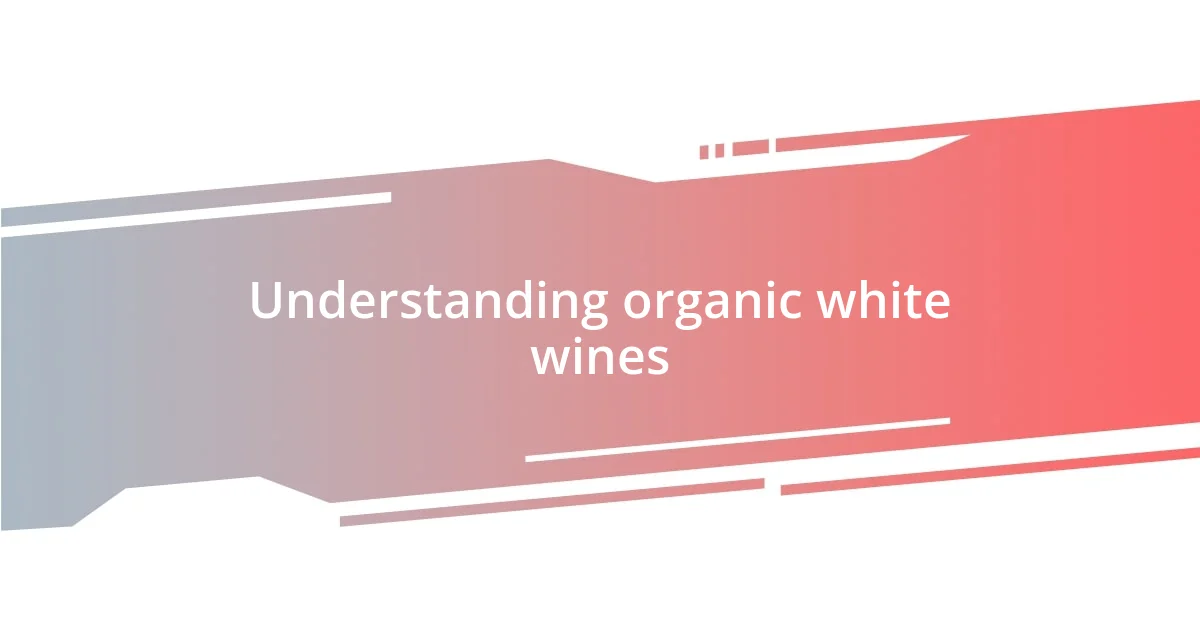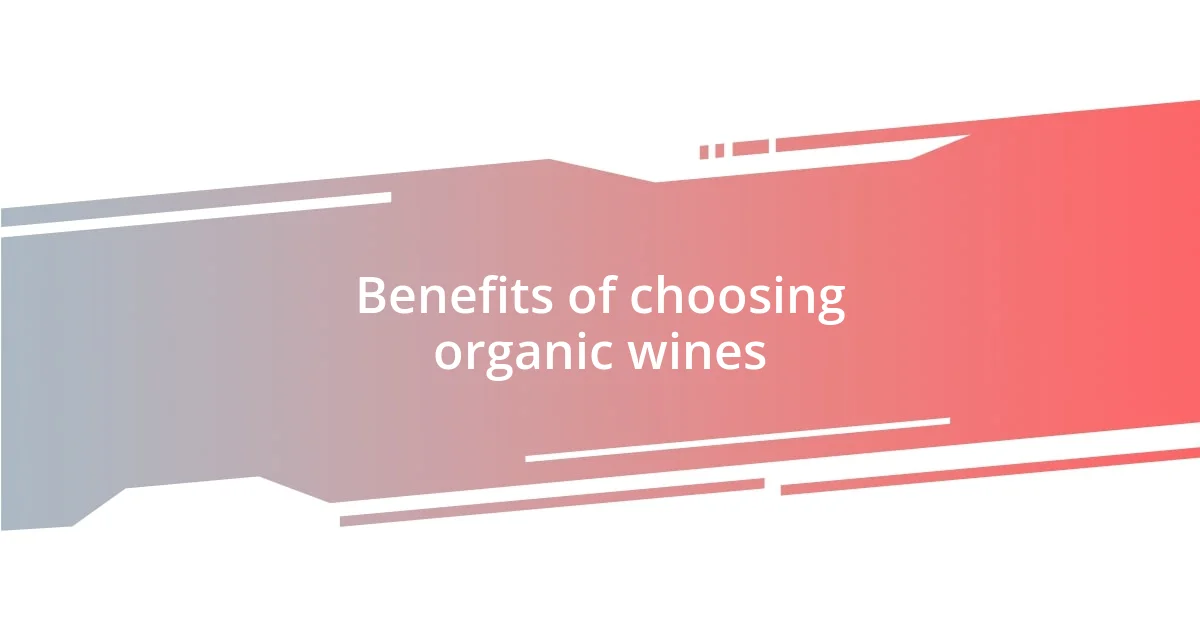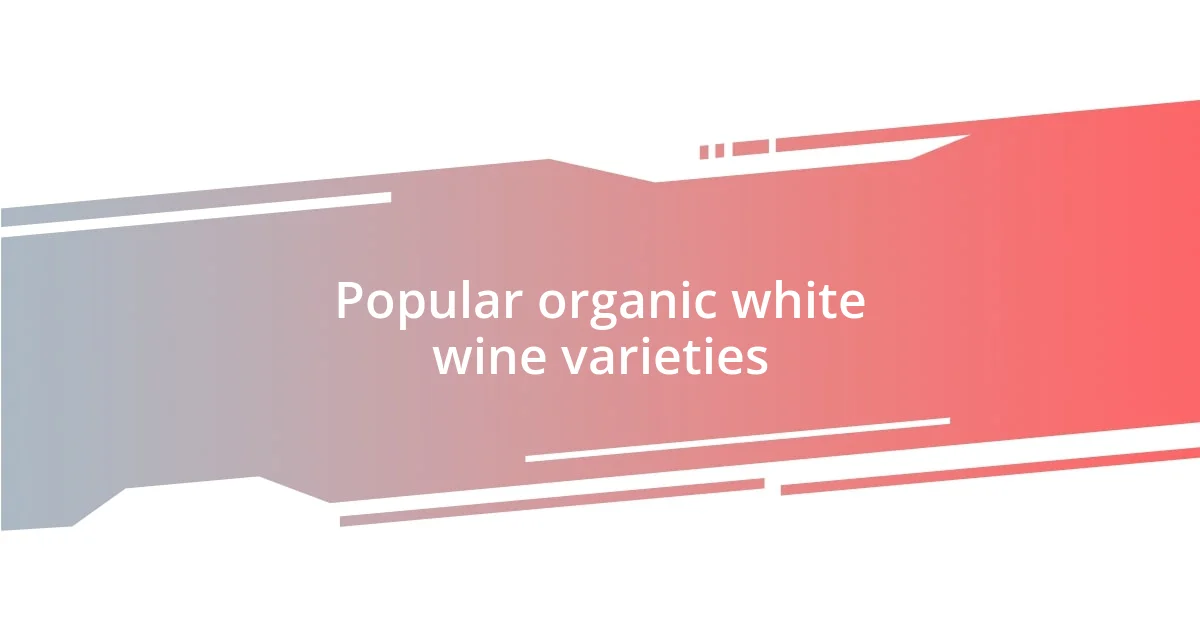Key takeaways:
- Organic white wines are produced from grapes cultivated without synthetic chemicals, resulting in a greater expression of terroir and unique flavors.
- Choosing organic wines supports environmental sustainability and may offer health benefits due to fewer additives and sulfites.
- Popular organic varieties include Sauvignon Blanc, Chardonnay, and Riesling, each providing distinct taste experiences that enhance meals and social moments.

Understanding organic white wines
Organic white wines are crafted from grapes grown without the use of synthetic pesticides, herbicides, or fertilizers. I remember the first time I sipped an organic Sauvignon Blanc; it felt like tasting the purity of the vineyard’s essence. I couldn’t help but wonder, how can something so simple be so vibrant and complex at the same time?
The identity of these wines also stretches into how they’re made. Many producers adhere to organic practices in both the vineyard and the winery, an approach that resonates with the philosophy of minimizing intervention. This dedication often results in a more authentic expression of the grapes. Have you ever tasted a wine that seemed to tell a story? That’s what I felt with an organic Chardonnay I once had, where the flavors evoked the very soil and sunshine from which it came.
I’ve noticed that organic white wines often carry a unique freshness that’s hard to find in conventional varieties. There’s a certain zest and clarity that can transform a simple meal into an exceptional experience. Doesn’t it feel rewarding to know that your choice in wine not only supports environmental sustainability but also enhances your enjoyment? Each bottle has its own narrative, and I find myself drawn to those tales told through every glass.

Benefits of choosing organic wines
Organic wines offer a myriad of benefits, starting with their positive impact on the environment. Whenever I choose an organic white wine, I can’t help but feel I’m making a conscious decision to support sustainable farming. It’s as if I’ve taken a small step towards nurturing the planet while enjoying a delightful glass of wine. Plus, knowing that those grapes were grown without harmful chemicals gives me a sense of peace.
From a health perspective, organic wines may be gentler on the body. I remember when I first experienced a mild headache after drinking conventional wine; it was a frustrating reminder of how additives can affect our well-being. In contrast, with organic wines, it’s refreshing to indulge without worrying about those synthetic compounds. Have you experienced this shift? For me, it’s not just about the taste—it’s about the overall experience of sipping something that feels purer and kinder.
Lastly, organic wines often showcase unique flavors that are deeply influenced by their terroir, the climate, and the soil where they’re grown. One evening, I opened a bottle of organic Pinot Grigio, and the vibrant citrus notes danced on my palate in a way that felt almost nostalgic. That authenticity creates a genuine connection to the land, and I treasure every moment spent exploring these diverse expressions. Isn’t it exciting to think about how every sip tells a story that transcends time and space?
| Benefit | Description |
|---|---|
| Environmental Sustainability | Supports eco-friendly practices, reducing chemical use and promoting biodiversity. |
| Healthier Choice | Contains fewer additives and sulfites, potentially reducing negative health effects. |
| Unique Flavors | Highlights the terroir and offers authentic taste experiences from specific wine regions. |

Popular organic white wine varieties
The world of organic white wines is incredibly rich, with several varieties standing out due to their unique characteristics. One of my favorites is the organic Sauvignon Blanc. Each time I take a sip, I’m transported back to sun-drenched vineyards. The bright acidity and the playful citrus notes really bring the season alive. Have you ever found a wine that instantly reminds you of summer?
Another popular choice is the organic Chardonnay. I remember enjoying a chilled bottle while sharing laughs with friends on a warm evening. The buttery texture combined with subtle oak notes is comforting, yet sophisticated. It’s amazing how organic farming methods can truly elevate the wine’s complexity, right? You can taste the dedication of the vineyard in each glass, adding that personal touch to every gathering.
Don’t overlook the organic Riesling, either. Its floral aroma and refreshing sweetness can turn an ordinary dinner into a special occasion. One evening, I paired an organic Riesling with spicy Asian cuisine, and the delightful contrast created a dance of flavors in my mouth. Isn’t it fascinating how the right wine can enhance not just the meal but also the moments we share around the table? Each variety, in its own way, offers a unique journey through the vineyard, and I often find myself eager to explore them all.













